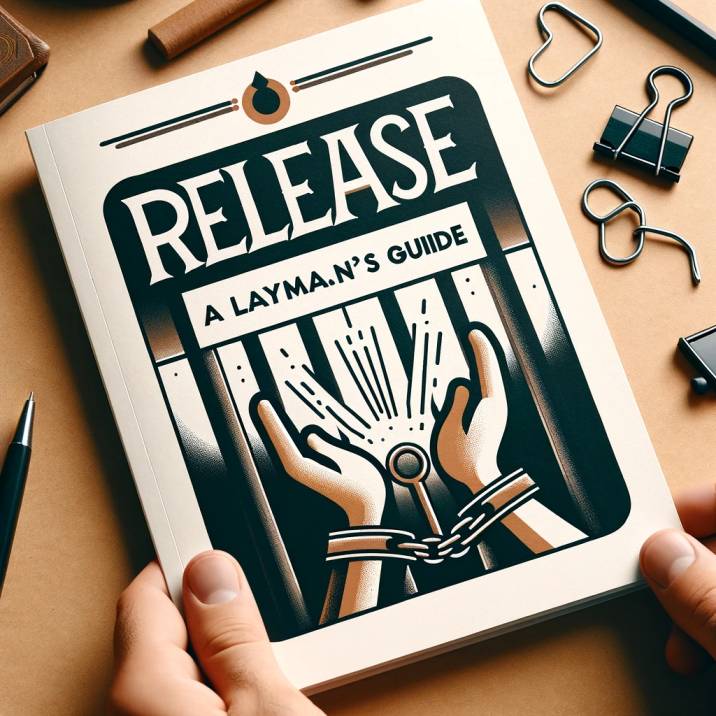In this Article we have explained Bail Procedures in India
Introduction:
Understanding the bail process in criminal cases within the Indian legal framework is crucial for individuals navigating the judicial system. This detailed guide, enriched with insights from recent Supreme Court and High Court rulings, aims to provide an in-depth understanding of the bail procedure in India.
Keywords: Bail Procedure, Supreme Court Rulings, High Court Decisions, Criminal Law, Legal Representation, Bail Application Process, Judicial Discretion, Anticipatory Bail, Regular Bail, Bail Conditions
Comprehensive Guide to Obtaining Bail in Criminal Cases: Insights and Recent Legal Developments
Understanding Bail in Indian Criminal Law:
Bail refers to the conditional release of an accused person pending trial. It’s an integral part of the criminal justice system, allowing for the balance of the accused’s rights and the demands of justice.
Recent Legal Developments:
In recent years, there have been significant legal developments impacting bail laws:
- Supreme Court Rulings: The apex court has set precedents in several cases, emphasizing the right to a fair trial and the presumption of innocence.
- High Court Decisions: High Courts across India have passed judgments that refine the understanding of bail conditions, especially in complex cases.
Types of Bail in India:
- Regular Bail: Granted post-arrest for offenses where bail is permissible.
- Anticipatory Bail: Applied for in anticipation of arrest, especially in non-bailable offenses.
- Interim Bail: Temporary relief granted for a short period, pending the final decision on the bail application.
The Bail Application Process:
The process involves filing a bail application in the appropriate court, supported by legal documentation and arguments. This process can be intricate, often requiring the expertise of seasoned lawyers.
You can Read :- How to get Bail in Criminal Case
Factors Influencing Bail Decisions:
Courts consider various factors, including:
- Nature and gravity of the offense.
- Accused’s criminal history.
- Risk of the accused absconding or influencing witnesses.
- Recent legal interpretations by higher courts.
Bail Conditions:
Courts often impose conditions like travel restrictions, reporting to the police station, and not tampering with evidence. Recent rulings have focused on ensuring these conditions are fair and not excessively restrictive.
Impact of Legal Representation:
Effective legal representation is crucial. Lawyers play a key role in presenting the case, referencing relevant legal precedents, and negotiating bail conditions.
Recent Noteworthy Cases:
- Supreme Court on Personal Liberty: Recent judgments have reinforced the importance of personal liberty and due process in bail matters.
- High Court on Bail for Economic Offenses: There’s a growing body of rulings regarding bail in cases involving economic offenses, with courts taking a nuanced approach based on the severity and impact of the offense.
Key Judgments Shaping Bail Law:
- State of Rajasthan v. Balchand (1977): The Supreme Court emphasized that bail, not jail, is the basic rule.
- Gudikanti Narasimhulu v. Public Prosecutor (1978): Reinforced the importance of personal liberty in bail considerations.
- Sanjay Chandra v. CBI (2012): Highlighted that bail is a rule and jail an exception.
- Arnab Manoranjan Goswami v. The State of Maharashtra & Ors (2020): Reiterated the sanctity of personal liberty.
- Nikesh Tarachand Shah v. Union of India (2017): Examined bail provisions under the Prevention of Money Laundering Act.
- Bhagwan Rama Shinde Gosai v. State of Gujarat (1999): Focused on the right to speedy trial in context of bail.
- P. Chidambaram v. Directorate of Enforcement (2019): A significant decision involving bail in a high-profile corruption case.
- Sushila Aggarwal v. State (NCT of Delhi) (2020): Clarified the duration for which anticipatory bail should be granted.
- Neeru Yadav v. State of U.P. (2014): Allahabad High Court’s decision on bail in the context of heinous crimes.
- Mehboob Dawood Shaikh v. State of Maharashtra (2004): Bombay High Court’s view on bail in cases with circumstantial evidence.
- Dataram Singh v. State of Uttar Pradesh & Anr (2018): Asserted that detention should only be used when necessary.
- Prasanta Kumar Sarkar v. Ashis Chatterjee (2010): Explored the conditions under which bail can be granted in heinous offenses.
- Moti Ram v. State of M.P. (1978): Discussed the rights of undertrial prisoners.
- Rajesh Ranjan @ Pappu Yadav v. CBI through its Director (2007): Dealt with the issue of prolonged judicial custody.
- Ram Govind Upadhyay v. Sudarshan Singh (2002): Patna High Court’s ruling on the right to bail and personal liberty.
- Sanjay Dutt v. State through C.B.I., Bombay (1994): A landmark judgment on bail under TADA.
- Kalyan Chandra Sarkar v. Rajesh Ranjan alias Pappu Yadav & Anr (2004): Supreme Court’s decision on successive bail applications.
- Amarmani Tripathi v. State of U.P. (2005): Considered the severity of the offense and societal impact in bail decisions.
- Bail Application No. 2224 of 2010 in Siddharam Satlingappa Mhetre v. State of Maharashtra and Ors: Emphasized the importance of individual liberty and the role of the state.
- Lavesh v. State (NCT of Delhi) (2012): Addressed bail in the context of repeat offenders and the societal risk they pose.
Conclusion:
Navigating the bail process in India requires an understanding of both the legal framework and recent judicial trends. This guide provides a comprehensive overview, but it’s essential to seek professional legal advice for specific cases.
Final Note:
This article is intended as a guide and not as legal counsel. For individual cases and detailed legal advice, consultation with legal professionals is strongly recommended
30 FAQs on Obtaining Bail in Criminal Cases: Insights and Recent Legal Developments
- What is bail in criminal cases?
Bail is a legal provision that allows an accused person to be released from custody until their trial, usually under specific conditions. - How is bail obtained in India?
Bail is obtained by filing a bail application in the relevant court, often through a lawyer, and then a judge decides based on various factors. - What are the types of bail in India?
The main types are regular bail, anticipatory bail, and interim bail. - What factors influence bail decisions?
Factors include the nature of the crime, the accused’s past criminal record, the likelihood of the accused fleeing, and potential interference with evidence. - Can bail be denied?
Yes, especially in cases of serious crimes or where there’s a high risk of the accused fleeing or tampering with evidence. - What recent legal developments affect bail?
Recent Supreme Court rulings have emphasized the importance of personal liberty and the need to balance it with public safety and justice. - What is anticipatory bail?
Anticipatory bail is granted before a person is arrested, allowing them to avoid arrest under certain conditions. - What happens if bail conditions are violated?
Violating bail conditions can result in arrest and potential revocation of the bail. - How long does the bail process take?
This varies based on the complexity of the case and the court’s schedule. - Are bail amounts standardized?
No, they vary based on the nature of the crime, the accused’s financial status, and other factors. - Can bail be appealed?
Yes, a bail decision can be appealed in a higher court. - What is a bail bond?
A bail bond is a financial guarantee to the court ensuring the accused’s appearance at trial. - Who can be a surety for bail?
A surety is typically a responsible adult who agrees to ensure the accused appears in court and complies with bail conditions. - What’s the role of a lawyer in obtaining bail?
Lawyers play a crucial role in presenting the case for bail and navigating the legal procedures. - Can non-bailable offenses receive bail?
Yes, but it’s more challenging and depends on the court’s discretion. - What are common bail conditions?
Common conditions include travel restrictions, reporting to police, and no contact with victims or witnesses. - How do recent rulings impact bail in financial crimes?
Courts are increasingly scrutinizing bail in financial crimes, focusing on the magnitude and impact of the offense. - Can police grant bail in India?
In some minor offenses, police have the authority to grant bail. - What is a no-bail offense?
A no-bail offense typically refers to a serious crime where bail is not typically granted. - Can bail be granted in drug-related cases?
Yes, but these cases are often treated stringently given their seriousness. - How does one apply for anticipatory bail?
Anticipatory bail is applied for in the same way as regular bail, but before any potential arrest. - What is the importance of the habeas corpus in bail?
Habeas corpus can be used to challenge unlawful detention when bail is denied without proper legal basis. - How do personal circumstances affect bail?
Personal circumstances like health, age, and family responsibilities can influence bail decisions. - Can foreign nationals get bail in India?
Yes, but additional conditions might apply due to the flight risk. - Is bail available during police custody?
Yes, but this is typically through a regular bail application. - What documents are needed for a bail application?
Documents include identification, evidence of address, and information regarding the alleged offense. - Can bail be obtained for repeat offenders?
Yes, but repeat offenders may face stricter conditions or denial of bail. - How does the court determine bail amounts?
The court considers the nature of the offense, the accused’s financial status, and the need to ensure the accused appears in court. - What happens after bail is granted?
The accused is released from custody but must comply with the bail conditions until trial. - Is legal aid available for bail applications?
Legal aid can be available, especially for those who cannot afford a private lawyer.
Sources
- Balchand v. State of Rajasthan (1977)
- Gudikanti Narasimhulu v. Public Prosecutor (1978)
- Sanjay Chandra v. CBI (2012)
- Arnab Manoranjan Goswami v. The State of Maharashtra & Ors (2020)
- Nikesh Tarachand Shah v. Union of India (2017)
- Bhagwan Rama Shinde Gosai v. State of Gujarat (1999)
- P. Chidambaram v. Directorate of Enforcement (2019)
- Sushila Aggarwal v. State (NCT of Delhi) (2020)
- Neeru Yadav v. State of U.P. (2014)
- Mehboob Dawood Shaikh v. State of Maharashtra (2004)
- Dataram Singh v. State of Uttar Pradesh & Anr (2018)
- Prasanta Kumar Sarkar v. Ashis Chatterjee (2010)
- Moti Ram v. State of M.P. (1978)
- Rajesh Ranjan @ Pappu Yadav v. CBI through its Director (2007)
- Ram Govind Upadhyay v. Sudarshan Singh (2002)
- Sanjay Dutt v. State through C.B.I., Bombay (1994)
- Kalyan Chandra Sarkar v. Rajesh Ranjan alias Pappu Yadav & Anr (2004)
- Amarmani Tripathi v. State of U.P. (2005)
- Siddharam Satlingappa Mhetre v. State of Maharashtra and Ors (Bail Application No. 2224 of 2010)
- Lavesh v. State (NCT of Delhi) (2012)
















